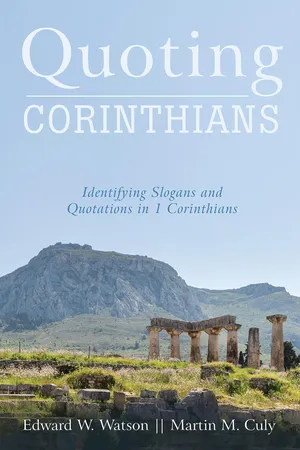![]()
1
The Challenge Before Us
Why should we study the places in 1 Corinthians where Paul might be quoting Corinthians? The answer may surprise you! Identifying when Paul is quoting Corinthians may actually significantly affect our understanding of 1 Corinthians. And, consequently, it may also affect how we live and worship as followers of Jesus Christ. What we will discuss below is important not simply for scholars, but for people in the pews. Perhaps when you encounter a book like this, particularly if you are forced to read it for a course you are taking, your first questions are, “So what? How does this have any relevance to my life?” Given the importance of such questions, we will address them initially in the paragraphs that follow and also engage them throughout this book, rather than expecting readers to figure out the relevance of this study on their own.
First Things First
Scholarly treatments of 1 Corinthians often refer to Corinthian “slogans.” Virtually all scholars agree that Paul at times in 1 Corinthians cites the positions of particular factions within the church with whom he disagrees before qualifying or correcting their faulty thinking. The label “slogan” is actually a broad category (similar to the term “maxim,” which was used in the ancient Greek rhetorical handbooks), which includes established expressions of dogma, mottos, common sayings, and perhaps even brief ways of capturing the gist of an opponent’s way of thinking. Thus, although the slogans typically represent actual stated positions of various groups in the church in Corinth, at times when Paul “quotes” the Corinthians, he may be putting their thinking or behavior into a succinct statement that he has himself created as a convenient way of engaging their position. In other words, Paul may at times quote the Corinthians as if they had said something that they had never explicitly stated, but his quote nevertheless accurately represents their position. In either case, the intended Corinthian readers would have easily recognized their own slogan or Paul’s pithy summary of behavior or thinking within the church.
It is indisputable that Paul refers to his readers’ positions in 1 Corinthians. For example, to deal with quarrels within the church that he learned about from oral reports (1:11), Paul appears to quote the slogans of some of his readers in 1:12: “What I mean is that each of you says, ‘I belong to Paul,’ or ‘I belong to Apollos,’ or ‘I belong to Cephas,’ or ‘I belong to Christ.’” He then seeks to correct the flawed thinking of his readers in 1:13: “Has Christ been divided? Was Paul crucified for you? Or were your baptized in the name of Paul?” Although these quotations are easy to spot, other potential slogans or quotations are far less obvious. This is where our challenge lies. We should rightly assume that the Corinthian readers would have easily recognized when Paul was referring to their own positions (quoting them). They would have then been well prepared to hear how Paul reacted to those positions. Since we are not first-century Corinthians, however, we are left to attempt to put ourselves in their shoes and use every tool at our disposal to determine when Paul was quoting them.
What Is at Stake?
Why is our study so important? Plain and simple, identifying embedded slogans in 1 Corinthians will significantly impact our interpretation of the relevant passages. It is, therefore, imperative that we determine where Paul is using slogans or quotations so that we will be able to separate what Paul is saying from what the Corinthians have said. As Smith rightly points out,
For most Christians, the only way of determining whether a biblical writer is quoting someone else or not is to consult the Bible translation they normally use. English readers tend to assume that if there are quotation marks, there is a quote; if there are no quotation marks, no quote. Bible translation, however, always involves interpretation; and this is particularly true when the original writers sometimes quoted other sources without explicitly identifying that material as a quotation. How do we know when the biblical writers were quoting someone else? Unlike the “clear” quotations we find in 1 Cor 1:12, most of the other potential quotes in 1 Corinthians are not conveniently introduced by a helpful expression like, “You say.” And English translations of the relevant passages do not always agree on when Paul is quoting Corinthians and when he is expressing his own opinion.
For example, in 1 Cor 7:1, Paul refers to questions that were raised in a letter from Corinth. Some translations put the issue addressed in 7:1 in quotation marks, indicating that Paul is quoting Corinthians: “Now concerning the matters about which you wrote: ‘It is well for a man not to touch a woman’” (NRSV). Paul then objects to this slogan in 7:2–5. The NIV (1984) and NASB, on the other hand, translate the clause without quotations marks, leaving the impression that the opinion is actually Paul’s perspective, or perhaps leaving it to the reader to decide: “Now concerning the things about which you wrote, it is good for a man not to touch a woman” (NASB). This, of course, creates other problems for Bible readers as they try to interpret Paul’s subsequent words. We will return to this passage in more detail in chapter 7.
Even when translators agree that Paul is quoting Corinthians, however, they do not always agree on where the quote begins and ends. Both the NRSV and the NIV 1984, for example, make it clear through the use of quotation marks that Paul is quoting a Corinthian slogan in 1 Cor 6:13, but the NIV 2011 and NET extend the quotation further than the NRSV or NIV 1984:
